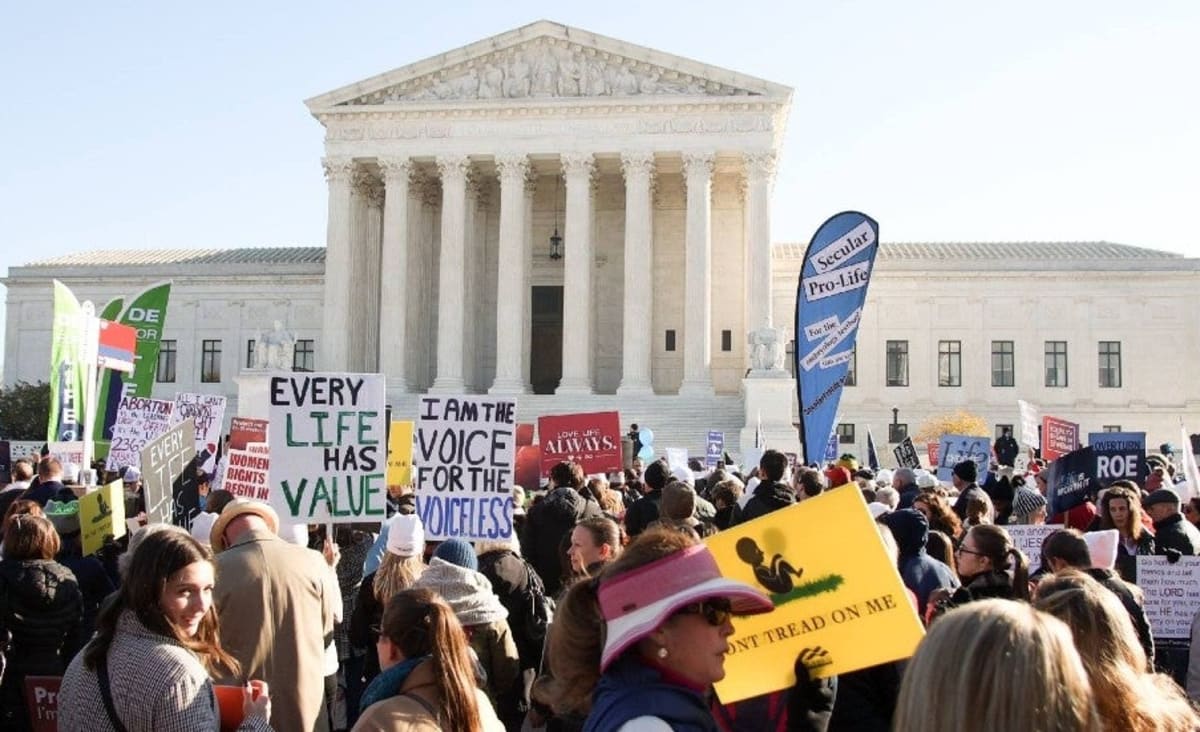
thehill.com
65M women could lose abortion rights in Supreme Court case
More than 65 million American women would immediately lose access to an abortion in their home states if the U.S. Supreme Court strikes down the landmark case that established the right to seek the procedure nearly half a century ago.
Politics
More than 65 million American women would immediately lose access to an abortion in their home states if the U.S. Supreme Court strikes down the landmark case that established the right to seek the procedure nearly half a century ago.
Existing laws on the books in 20 states ban abortions or impose substantial restrictions on women or on abortion providers. Those laws are on hold, either blocked by courts or superseded by the high court’s 1973 decision in Roe v. Wade that protected a woman’s right to an abortion without excessive restrictions.
But the high court is now considering arguments in another case, Dobbs v. Jackson, that gives the conservative majority their most significant chance in decades to gut the Roe precedent. In oral arguments Wednesday, the six conservatives seemed open to allowing a Mississippi law that bars abortions after 15 weeks to stand, undermining the core principles of the Roe verdict.
The court is not expected to rule on the case for months; typically, justices wait to release opinions in their most explosive cases until the end of their yearly term in June.
But the scenario in which justices overturn Roe is one for which conservatives have been preparing for decades, by laying a foundation of laws that either sought to bring a challenge to the high court or snap into effect once abortion laws changed.
Twelve states — Arkansas, Idaho, Kentucky, Louisiana, Mississippi, Missouri, North Dakota, Oklahoma, South Dakota, Tennessee, Texas and Utah — have passed laws that would bar all or nearly all abortions, written in a way that would allow them to take effect after the Supreme Court overturns Roe, according to the Guttmacher Institute, a pro-abortion rights research institution.
Those laws vary by state, but they all have language that describes how they would take effect, said Elizabeth Nash, director of state issues at the Guttmacher Institute. Some require the state attorney general to certify that the Supreme Court’s decision allows their state to ban abortions.
Eight states — Alabama, Arizona, Arkansas, Michigan, Mississippi, Oklahoma, West Virginia and Wisconsin — still have abortion bans on the books that were passed years, and sometimes decades, before Roe was decided. Texas has a similar law that is under injunction by a federal court.
But if the precedent is struck down, those laws would be enforceable once again, and the Supreme Court ruling would likely allow Texas’s law to take effect.
“If Roe is overturned, then states with pre-Roe bans could take the steps necessary to implement them,” Nash said.
The 17 states, some of which have laws that both predate and post-date the Roe decision, are home to a collective 51 million women. Georgia, Ohio and South Carolina, which have each passed restrictions on abortion that were ruled unconstitutional under Roe but could be reinstated depending on the court’s ruling, are home to another 14 million women.
Collectively, the 65 million women who live in states where abortion restrictions would take effect in a post-Roe world represent almost 40 percent of the 165 million women who live in the United States.
“States have really caught on fire with the hope and the anticipation of this very thing. So a lot of states are poised and ready for the Dobbs decision,” said Sue Swayze Liebel, state policy director at the Susan B. Anthony List, a group that supports candidates who oppose abortion rights. “States have been rushing to pass heartbeat bills and trigger laws and early bans on abortion as far back as they think they can go.”
Some of the laws that predate Roe harken back nearly a century or more, to a time when no state explicitly allowed abortions and before the advances of modern medicine.
In Michigan, Gov. Gretchen Whitmer (D) has called on the legislature to repeal a 1931 law that makes a felony of administering medicine or performing an abortion. An even older statute has banned abortions there since at least the 1840s. After oral arguments this week, state Senate Majority Leader Mike Shirkey (R) shot down Whitmer’s proposal.
“Michigan has terrific laws already in place. They’ve been superseded by the former Supreme Court ruling. And if that is reversed, then Michigan stands very well positioned,” Shirkey told the Michigan Public Radio Network.
























































